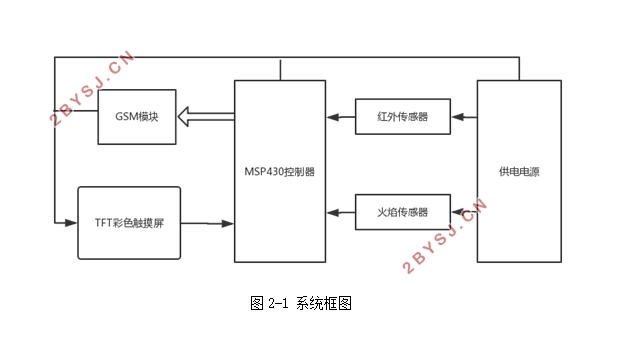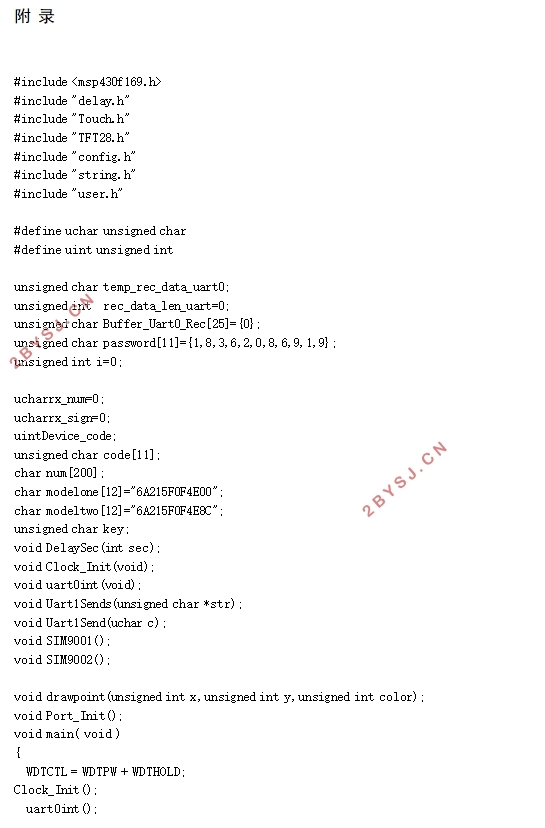基于GSM短信模块的家庭安全报警系统设计
无需注册登录,支付后按照提示操作即可获取该资料.
基于GSM短信模块的家庭安全报警系统设计(论文14000字)
摘 要:本论文设计的是基于GSM短信模块的家庭无线安全报警系统,主要内容是通过GSM短信模块和MSP430单片机进行报警控制。该系统主要包括用MSP430F149单片机作为核心控制单元,红外传感器和火焰传感器进行家庭安全探测,GSM短信模块实时连接单片机和用户手机,TFT彩色触摸屏便于用户观察和触摸操作。当模块重启后,通过液晶屏界面询问是否更改用户手机号码,提高系统的灵活性。当探测器检测到危险时,发出报警信号给单片机,单片机控制GSM模块给用户发送相对应的短信内容。
关键词:GSM模块;MSP430F49单片机;传感器;TFT彩色触摸屏
Home security alarm system based on GSM short message module
Abstract:This thesis designs the home wireless security alarm system based on the GSM short message module. The main content is the GSM short message module and MSP430 MCU for alarm control. The system mainly includes the use of MSP430F149 microcontroller as the core control unit, infrared sensors and flame sensors for home security detection, GSM short message module real-time connection to the microcontroller and the user's mobile phone, TFT color touch screen to facilitate user observation and touch operation. After the module is restarted, the LCD screen asks whether to change the user's mobile phone number to improve the system's flexibility. When the detector detects a danger, it sends an alarm signal to the SCM. The SCM controls the GSM module to send the corresponding message content to the user.
Keywords: GSM module;MSP430F49 microcontroller;sensor;TFT color touch screen


目录
第一章 绪论 1
1.1 研究的背景和意义 1
1.2 国内外研究现状 1
1.2.1 国内研究现状 1
1.2.2 国外研究现状 2
1.3 研究的主要内容 3
1.4 本章小结 3
第二章 系统方案研究与设计 4
2.1 系统总体方案 4
2.2 系统总体方案设计 5
2.2.1 GSM短信平台 5
2.2.2 传感器 5
2.2.3 TFT彩色触摸屏 6
2.3 本章小结 6
第三章 系统的硬件电路设计 7
3.1 MSP430F149最小系统 7
3.2 GSM短信模块 10
3.3 TFT彩色触摸屏 12
3.4 红外传感器 14
3.5本章小结 15
第四章 家庭安全报警系统的软件设计 16
4.1 短信控制命令集 16
4.2 软件设计 16
4.2.1 主程序设计 16
4.2.2 主控制任务 17
4.2.3 GSM短信任务 17
4.2.4 传感器任务 18
4.2.5 TFT触摸屏任务 18
4.3 本章小结 19
第五章 系统测试 20
5.1 GSM短信模块AT指令测试 20
5.2 传感器模块测试 21
5.3 TFT彩色触摸屏测试 21
5.4 系统硬件测试 22
5.4.1 硬件系统实物图 22
5.4.2 测试结果 23
5.5 本章小结 23
第六章 总结与展望 24
6.1 论文总结工作 24
6.2 对本次设计的展望 25
参考文献 25
致谢 26
附 录 27
